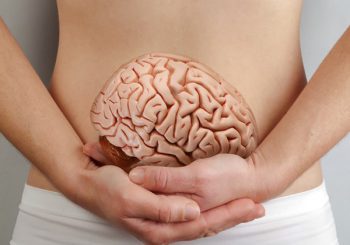Contributing writer for Wake Up World
What do depression, anxiety, ADHD, autism, epileptic seizures and many other mental and behavioral disorders have in common? A dysfunctional digestive system.
The digestive system has been called the “second brain”. The enteric nervous system (ENS), a branch of the autonomic nervous system, which is in the digestive system, can communicate and function independently of the brain! ENS is composed of approximately 500 million neurons. It can “think”, “memorize” and “learn” on its own.
[pro_ad_display_adzone id=”110028″]
ENS covers the mucosa of many organs: esophagus, stomach, small intestine, large intestine, pancreas, gallbladder. It is involved in regulating several essential digestive functions – the secretion of digestive enzymes, intestinal and gallbladder motility, regulating the function of the gastric and esophageal sphincter (to prevent the acid from rising on the esophagus and allowing swallowing).
Many researchers mention the important role of ENS in regulating behavior. This is because ENS communicates with the brain via the vagus nerve. SNE also uses more than 30 neurotransmitters, including serotonin, GABA, dopamine and acetylcholine.
95% of serotonin is found in the intestines and the imbalances in its levels are a major cause for: depression, bi-polar disorders, anxiety, migraines and insomnia. Also, GABA which is also found in the intestines affects mood, sleep and cognition.
The intestinal microbiom has a strong regulatory effect on enteric neurons, and certain bacterial colonies can induce behavioral changes. Intestinal flora makes up about 80% of the body’s immune system. Immediately after birth, the act of breastfeeding results in the implantation of the essential flora in the digestive system of the child, thus contributing substantially to the development of a healthy immune system. A study has shown that a short period of breastfeeding is associated with the development of ADHD syndrome in children.
The intestines are covered by 100 trillion micro-organisms, nearly ten times the amount of cells that make up the human body. It is estimated that there are 400 – 1000 different species of bacteria found in the intestines, with complex relationships and communication networks between them. Bacterial species that have been studied for their role in behavior modification and impairment are bifidus infantum, lactobacillus reuteri, rhamnosus, lactobacillus helveticus, bifido longum.
The probiotic bifido infantis has been studied for its role in reducing depression and irritable bowel symptoms. Lactobacillus reuteri has been studied for its effects against anxiety and strong modulation of the immune system, especially by inhibiting TNF-?. L-reuteri is well known for altering the GABA neurotransmitter and central nervous system, as is the case with lactobacillus rhamnosus.
L-helveticus and B-longum have been studied for their role in alleviating stress, anxiety and depression. There are many other studies and clinical evidence attesting to the role of gut bacteria in human behavior.
Real Causes That Determine Poor Brain Function
It often happens that when the digestive system is dysfunctional, the intestinal mucosal barrier is also altered and the protection against pathogens is compromised. In this case the body will suffer from inflammation in multiple places, many of them surprising, such as the brain! This is why it is essential that digestion, assimilation and intestinal immunity function effectively. Leaky gut syndrome has a direct effect on behavior; there is a direct link between high intestinal permeability, pathogen infections and psychiatric disorders.
Often, the imbalance of the intestinal flora is accompanied by dietary sensitivities that may contribute to the alteration of the intestinal flora, but may also be amplified by the gastrointestinal dysfunction. Eliminating foods such as gluten, dairy products, eggs or foods rich in oxalates or histamine can make a big difference in healing the digestive system in depth.
The opioid peptides from gluten and casein (partially digested proteins from certain cereals and dairy products) can react with receptors in the brain, mimicking the effects of drugs such as morphine and heroin. These components called neuropeptides, react with parts of the brain that are involved in speech and auditory integration. Neuropeptides also decrease the ability to sense pain and impair cognitive function.
A key mechanism in intestinal permeability and mental and behavioral disorders refers to the effect of pathogens and bacterial species on the brain and neurotransmitter function. For example, streptococcal infections have been correlated in studies with obsessive compulsive symptoms, tics and Tourette’s syndrome. In addition, the immune response that results from streptococcal and other infections generates significant inflammation, including that of the brain.
It has been shown that the “coat” of gram-negative bacteria known as lipo-polysaccharides can induce massive systemic inflammation, including the release of pro-inflammatory cytokines such as TNF-? in the brain.
Pathogenic organisms such as Clostridia produce toxins that disrupt dopamine metabolism, causing mood swings, anxiety, aggression.
Due to the essential role of the tight junctions of the intestines that protect against antigen invasion, a weakening of the intestines can lead to increased permeability, allowing various pathogenic microbes to easily enter the bloodstream. This increased intestinal permeability induces high inflammatory activity in the brain, nervous system and many other parts of the body. There will also be imbalances in the gut flora and infections with pathogens and opportunistic microorganisms, such as Candida albicans. Candida affects the brain and mood by producing up to 79 toxic chemicals that are released into the body. That is why so many people who have Candida infections suffer from low concentration, depression, anxiety, fatigue.
Similarly, in people suffering from SIBO (bacterial overgrowth of the small intestine), there is a significant deficiency of B12 and the production of toxic chemicals, which mimic the function of neurotransmitters in the body. A study in mice showed that by changing and balancing the gut bacteria (through diet, probiotics, and nutrients) they changed their personality and behavior.
Researchers at Ohio State University have found that gut bacteria also affect the temperament of young children.
After examining 77 children aged 18 to 27 months, the researchers concluded that mood, curiosity, sociability, impulsivity and – in the case of boys – extroversion are related to the diversity of bacterial species in the digestive system.
So, there is enough clinical evidence that attests to the direct and essential link between the health of the digestive system and that of the brain. One more reason to consider that irritability, insomnia, depression or migraine has a major cause that is actually found in another area of the body than that of the … head!
By Healing the Digestive System You Can Reduce Inflammation and Improve Cognition
In general, people who consume prebiotics, probiotics (from food and supplements) and adequate amounts of fiber from vegetables and fruits, as well as traditionally fermented foods, will enrich their gut flora with beneficial bacteria. Often, this is not enough to restore balance in the digestive system; many other aspects must be considered, including: the consumption of a diet suitable for the metabolic type, the proper consumption of nutrients from supplements, biochemical balancing, healing of the leaky gut syndrome, elimination of intestinal pathogens, reduction of inflammation and toxicity.
The gastrointestinal tract is the main way the body uses to eliminates metabolic wastes and hazardous chemicals. Imbalances in the intestine such as chronic constipation, practically poison the body with pathogenic bacteria and toxic substances continuously. Ensuring proper intestinal motility is therefore essential. For this, not only the digestive balance must be solved, but also the function of the liver and gallbladder.
Other beneficial and important actions for maintaining a healthy microbiome that you can take are:?avoiding medical interventions that cause dysbiosis (imbalance in the intestinal flora), avoiding processed foods, food additives, pesticides, pollution, avoiding restrictive diets for long periods, medicines, especially antibiotics and powdered milk (for infants). Choose natural personal hygiene and cleaning products, based on essential oils and avoid conventional products with synthetic and toxic antimicrobial substances.
While addressing the real causes systematically, you can also add a variety of flavanoids to dampen neuroinflammation. The most powerful in this regard are: apigenin, luteolin, baicalin, resveratrol, rutin, catechin, curcumin.
For a precise detection of pathogenic and beneficial microorganisms, and a correct evaluation of the intestinal microbiome, I use a very comprehensive analysis through the GI Ecologix test in my practice. The result can thus offer many important clinical information that cannot be detected in any other way and contribute to the development of a targeted plan for successful intestinal healing.
For specialized consultation for your health problems you can schedule an appointment here.
Resources:
- http://europepmc.org/abstract/MED/16358988
- http://www.ncbi.nlm.nih.gov/pubmed/18456279
- http://www.ncbi.nlm.nih.gov/pubmed/15765388
- http://onlinelibrary.wiley.com/doi/10.1111/j.1365- 2982.2010.01664.x/full#b28
- http://onlinelibrary.wiley.com/doi/10.1002/ibd.20448/full
- http://www.ncbi.nlm.nih.gov/pmc/articles/PMC3179073/
- http://www.ncbi.nlm.nih.gov/pubmed/18283240
- http://www.ncbi.nlm.nih.gov/pubmed/15995031
- http://www.ncbi.nlm.nih.gov/pubmed/18283240
- https://www.sciencedaily.com/releases/2015/05/150527091438.htm
- http://www.npr.org/sections/health-shots/2013/11/18/244526773/gut-bacteria-might-guide-the-workings-of-our-minds
- http://www.sciencedirect.com/science/article/pii/S1369527413000787
Originally published at metabolicenergy.net and reproduced here with permission.
Recommended articles by Raluca Schachter:
- Vitamin D Supplementation: This is Why It Can Be Wrong
- Hypothyroidism or Hashimoto’s? What You Need to Know and Why It Matters
- Understanding Cannabis Oil
- 6 Steps to Solve Your Blood Sugar Problems Permanently
- Antibiotic Resistant Infections: The Dangers… and How You Can Avoid Them
- What Really Happens When You Take Antibiotics?
- Understanding Inflammation and How to Eliminate It Naturally
- Listen to Your Body. Correct Food Ratios. Reverse Disease.
- Cholesterol Myths Debunked
- Follow The Money In “Sick-Care”: What’s Behind The Drugs And Needles?
- What Happens In Your Body When You Suffer From Thyroid Disease?
About the author:
 Raluca Schachter is a dedicated Clinical Nutritionist / Natural Health Practitioner a.k.a “The Health Detective”. Raluca was able to naturally reverse chronic health conditions she was struggling with most of her life, and now uses her knowledge to help as many people as possible do the same. Her health programs and diet plans offer a very unique and comprehensive approach to health, where individual nutritional and biochemical requirements are firstly met using specific nutrients and foods that each metabolism thrives on. Raluca offers her services to international clientele and her practice is fully online based. You can connect with Raluca at www.metabolicenergy.net and https://www.facebook.com/raluca.schachter.metabolicenergy
Raluca Schachter is a dedicated Clinical Nutritionist / Natural Health Practitioner a.k.a “The Health Detective”. Raluca was able to naturally reverse chronic health conditions she was struggling with most of her life, and now uses her knowledge to help as many people as possible do the same. Her health programs and diet plans offer a very unique and comprehensive approach to health, where individual nutritional and biochemical requirements are firstly met using specific nutrients and foods that each metabolism thrives on. Raluca offers her services to international clientele and her practice is fully online based. You can connect with Raluca at www.metabolicenergy.net and https://www.facebook.com/raluca.schachter.metabolicenergy
[pro_ad_display_adzone id=”110027″]







